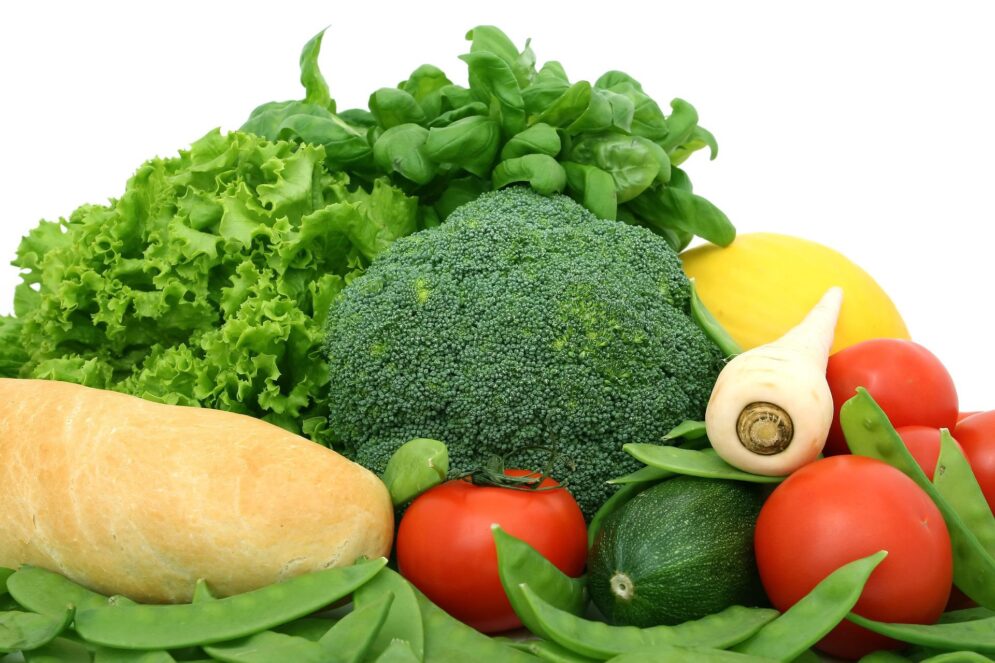Health
The Incredible Health Benefits of Vegetables: Unraveling the Mystery of Their Impact on Heart Health

Last Updated on June 2, 2023 by Nurse Vicky
The Incredible Health Benefits of Vegetables: Unraveling the Mystery of Their Impact on Heart Health
In today’s fast-paced world, where unhealthy food choices are abundant, incorporating vegetables into our diet has become more crucial than ever. Vegetables not only provide essential nutrients but also play a significant role in maintaining heart health.
In this comprehensive guide, we will explore the five incredible benefits of vegetables to the body, with a specific focus on their impact on heart health.
The Role of Vegetables in Promoting Heart Health
Heart disease is a prevalent and serious health concern globally, but numerous studies have shown that a diet rich in vegetables can significantly reduce the risk of cardiovascular problems. Incorporating vegetables into your meals offers a multitude of benefits for your heart’s well-being.
Nutrient Powerhouses for Heart Health
Vegetables are packed with essential nutrients that play a vital role in maintaining heart health. They are low in calories and high in vitamins, minerals, and dietary fiber. Nutrients such as potassium, magnesium, folate, and antioxidants like vitamins C and E are abundant in vegetables, contributing to their positive impact on the heart.
Lowering Blood Pressure with Vegetables
High blood pressure is a significant risk factor for heart disease. Vegetables, particularly leafy greens like spinach and kale, are rich in potassium, which helps regulate blood pressure levels. Potassium counters the effects of sodium in the body and promotes healthy blood vessels, reducing the risk of hypertension and related heart issues.
Promoting Healthy Cholesterol Levels
Maintaining healthy cholesterol levels is crucial for heart health, and vegetables can play a pivotal role in achieving this. Certain vegetables, such as Brussels sprouts and broccoli, contain soluble fiber that aids in lowering LDL (bad) cholesterol levels. Moreover, the antioxidants present in vegetables prevent the oxidation of LDL cholesterol, reducing the risk of plaque buildup in the arteries.
Reducing Inflammation and Oxidative Stress
Inflammation and oxidative stress are linked to the development of heart disease. Fortunately, vegetables possess anti-inflammatory and antioxidant properties that combat these harmful processes. Dark leafy greens, colorful vegetables like bell peppers and tomatoes, and cruciferous vegetables like cauliflower and cabbage are particularly effective in reducing inflammation and oxidative stress.
Supporting Healthy Weight Management
Maintaining a healthy weight is crucial for overall cardiovascular health. Vegetables are low in calories and high in fiber, making them an excellent addition to a weight management plan. The high fiber content in vegetables promotes satiety, reducing the chances of overeating and aiding in weight control.
Reduces insulin resistance
Whether you’ve already been diagnosed with insulin resistance or are unsure how to begin the process of reducing it, you can start by examining your sleeping habits. Determine one habit that can be changed to help you fall asleep.
It could be going to bed 15 minutes earlier than usual, reading a book instead of using your Ipad before bed or journaling your thoughts before bed. People who are overweight may also be able to improve their insulin sensitivity by losing belly fat, a type of visceral fat that surrounds organs.
Promotes collagen formation
Vitamin C is an essential nutrient that helps the body synthesize collagen. It plays a crucial role in preventing oxidative damage to lipid cell membranes and in the synthesis of collagen.
Vitamin C also hydroxylates proline, securing the chains of amino acids in a triple helix arrangement. In turn, vitamin C hydroxylates lysine, a nutrient that allows triple helices to cross-link and form tissue fibers.
Reduces cancer risk
Several studies show a correlation between fruit and vegetable intake and lowered risk of cancer. However, the evidence is still lacking and inconsistent. Although high intakes of fruit and vegetables protect against some types of cancer, a low intake does not make tissues super healthy.
It is important to note that dietary variations in fruit and vegetables may not significantly affect cancer risk in all populations. Thus, further studies should be conducted to determine the role of these foods in cancer prevention.
Reduces inflammation
A green leafy vegetable is rich in phytonutrients, which may reduce inflammation. Brussels sprouts, in particular, contain a compound that inhibits the inflammatory response in the body.
Other green leafy vegetables may help the body combat inflammation, including spinach, broccoli, cabbage, and kale. Other foods high in phytonutrients include nuts, seeds, and avocados. Eating a variety of whole foods, including fruit, is a fast, convenient way to get the health benefits of many vegetables.
Improves digestion
Fatty foods slow down your digestive system, causing constipation. To avoid constipation, eat foods rich in fiber. Instead of fatty meats, opt for lean ones. Both are heart-healthy and beneficial for digestion.
Beet greens are particularly beneficial for your health. They are loaded with calcium, iron, and beta-carotene. They also boost your Body’s defense against infections.
Flushes out toxins
Green tea can be a great way to flush out toxins. It contains catechins, a powerful antioxidant that boosts the liver’s function. Green tea is also great for digestion. It is also great in antioxidants and is known to reset the body and mind.
Ginger is another powerful natural healer that helps flush out toxins from the body. Try adding ginger to your tea or smoothie, or snack on ginger flavoured coconut chips.
FAQs (Frequently Asked Questions):
Are certain vegetables more beneficial for heart health than others?
While all vegetables have their unique nutritional profiles, leafy greens, cruciferous vegetables like broccoli and Brussels sprouts, and brightly colored vegetables tend to offer the most heart-healthy benefits due to their high nutrient content.
How many vegetables should I consume for optimal heart health?
The American Heart Association recommends at least five servings of vegetables per day, with a focus on a variety of colors to ensure a wide range of nutrients.
Can vegetables alone prevent heart disease?
While incorporating vegetables into your diet is essential for heart health, maintaining an overall healthy lifestyle, including regular exercise and a balanced diet, is equally important.
Are cooked vegetables as beneficial as raw vegetables for heart health?
Cooking vegetables can reduce certain nutrient levels, but it can also enhance the availability of others. Both raw and cooked vegetables have their advantages, so it’s beneficial to include a combination of both in your diet.
Can vegetables help with weight loss?
Yes, vegetables are an excellent addition to a weight loss plan due to their low-calorie and high fiber content. They promote satiety, control hunger, and provide essential nutrients while helping to manage calorie intake.
- Lowering Blood Pressure: High blood pressure is a significant risk factor for heart disease. Vegetables rich in potassium, such as spinach, Swiss chard, and sweet potatoes, help regulate blood pressure levels. Potassium acts as a natural diuretic, flushing out excess sodium and reducing the strain on the heart.
- Managing Cholesterol Levels: Vegetables high in soluble fiber, including eggplant, okra, and carrots, can help lower LDL cholesterol levels. Soluble fiber binds to cholesterol in the digestive tract, preventing its absorption into the bloodstream. Additionally, vegetables contain phytosterols, plant compounds that further aid in reducing cholesterol absorption.
- Supporting Heart-Friendly Antioxidants: Antioxidants are powerful compounds that protect the body against oxidative stress and inflammation, both of which contribute to heart disease.
- Colorful vegetables like tomatoes, bell peppers, and carrots are rich in antioxidants such as lycopene, beta-carotene, and vitamin C. These antioxidants neutralize harmful free radicals, preventing damage to the arteries and reducing the risk of heart disease.
- Boosting Heart-Healthy Nutrients: Vegetables are abundant in heart-healthy nutrients like folate, magnesium, and vitamins B6 and K. Folate helps lower homocysteine levels, an amino acid associated with an increased risk of heart disease.
- Magnesium supports proper heart rhythm and blood pressure regulation. Vitamins B6 and K play essential roles in preventing blood clotting and maintaining optimal cardiovascular function.
- Promoting Weight Management: Obesity and excess weight are major contributors to heart disease. Vegetables are naturally low in calories and high in fiber, making them an ideal choice for weight management. The fiber content in vegetables promotes feelings of fullness and reduces calorie intake, aiding in weight loss or maintenance.
Conclusion
The benefits of incorporating vegetables into your diet extend far beyond general health and well-being. Specifically, vegetables play a vital role in promoting heart health by lowering blood pressure, managing cholesterol levels, reducing inflammation, and supporting overall cardiovascular function.
By embracing a diverse range of vegetables and including them in your daily meals, you can enhance your heart health and reduce the risk of heart disease.
Health
Protein-Infused Diet Coke: The Viral ‘Dirty Soda’ Trend Taking TikTok by Storm

Protein-Infused Diet Coke: The Viral ‘Dirty Soda’ Trend Taking TikTok by Storm
The rise of quirky, unconventional food and drink trends is a staple of social media, but one concoction that’s recently captured TikTok’s imagination is “Protein Diet Coke,” fondly referred to as a “dirty soda.”
Combining the classic fizz of Diet Coke with creamy protein shakes, this bizarre yet fascinating combination has gained traction for its unique taste, nutritional benefits, and shareable aesthetic appeal.
But is it more than just a passing fad? Let’s dive into why this drink has taken the internet by storm, the health implications, and how you can make your own.
What Is Protein Diet Coke?
Protein Diet Coke is a mashup of two popular beverages: Diet Coke, known for its zero-calorie allure, and protein shakes, a go-to choice for fitness enthusiasts.
By blending these seemingly unrelated drinks, you get a fizzy, creamy concoction that surprises the palate and offers a protein-packed twist.
This beverage has become a TikTok sensation, with videos showcasing creative ways to personalize the drink by experimenting with flavors, toppings, and presentation.
How Did Protein Diet Coke Become a Trend?
The trend began with users sharing videos of themselves trying the drink and reacting to its surprising taste.
The hashtag #ProteinDietCoke amassed millions of views as influencers and everyday users alike showcased their custom recipes. Social media thrives on novelty, and the odd pairing of soda and protein shake fits the bill perfectly.
Moreover, this trend reflects a broader shift toward incorporating fun into fitness and healthy eating. As people explore unique ways to stay healthy, Protein Diet Coke offers a mix of indulgence and nutrition.
Health Benefits of Protein Diet Coke
1. Boosts Protein Intake:
Protein is essential for muscle repair, weight management, and overall body function. By mixing Diet Coke with a protein shake, you create a delicious way to meet your daily protein goals.
2. Low-Calorie Alternative:
For those watching their calorie intake, using Diet Coke and low-sugar protein shakes keeps the drink guilt-free while satisfying cravings for something sweet and fizzy.
3. A Fun Recovery Drink:
The combination of carbonation and protein makes this drink a potential post-workout recovery option. While traditional recovery drinks are effective, Protein Diet Coke brings a fun twist to replenishing nutrients.
Possible Drawbacks of Protein Diet Coke
While this beverage has many enthusiasts, it’s not without its critics.
1. Artificial Sweeteners:
Diet Coke contains artificial sweeteners like aspartame, which some people prefer to avoid due to potential health concerns.
2. Unusual Flavor:
Not everyone loves the combination of cola and creamy textures. For some, it’s an acquired taste.
3. Limited Nutritional Value from Soda:
Though protein shakes provide nutrients, the soda itself doesn’t offer significant health benefits. Consuming it in moderation is key.
How to Make Protein Diet Coke at Home
Ingredients:
- 1 can of Diet Coke (12 oz)
- 1 scoop or 8 oz of your favorite protein shake (vanilla or caramel flavors work best)
- Ice cubes
- Optional: toppings like whipped cream, syrups, or fruit
Instructions:
- Fill a glass with ice cubes.
- Pour the Diet Coke into the glass, leaving some space for the protein shake.
- Slowly add the protein shake to the Diet Coke. Stir gently to combine.
- Customize with toppings or syrups if desired.
- Enjoy immediately!
Why Do People Love It?
The allure of Protein Diet Coke lies in its unexpected combination and social media appeal.
The drink’s unique flavor profile intrigues people, while its aesthetic presentation makes it Instagram-worthy.
Additionally, it’s a fun way to consume protein without feeling like you’re drinking a traditional shake.
Creative Variations of Protein Diet Coke
1. Mocha Protein Soda:
Add a chocolate-flavored protein shake for a mocha-inspired treat.
2. Tropical Twist:
Use coconut-flavored protein powder and garnish with pineapple slices.
3. Spicy Cola Blend:
Mix in a dash of cinnamon or chili powder for a bold kick.
4. Vanilla Caramel Float:
Top with a dollop of whipped cream and caramel drizzle for an indulgent dessert-like drink.
Is Protein Diet Coke Here to Stay?
Trends often fade as quickly as they emerge, but Protein Diet Coke might have staying power due to its flexibility and nutritional appeal. As long as social media continues to celebrate creativity in the kitchen, this quirky beverage is likely to remain a go-to option for adventurous foodies.
Conclusion
Protein Diet Coke is more than just a viral sensation; it’s a testament to how creativity can turn everyday ingredients into something extraordinary.
While it may not replace traditional sources of protein or be everyone’s cup of tea (or soda), it has undeniably carved out a niche in the world of health-conscious indulgence.
Whether you’re in it for the taste, the health benefits, or the TikTok-worthy moments, this “dirty soda” trend is worth a try.
FAQs
1. Can I use regular Coke instead of Diet Coke?
Yes, but keep in mind that regular Coke has significantly more sugar and calories, which might defeat the purpose of a low-calorie drink.
2. What type of protein shake works best?
Vanilla and caramel protein shakes are popular choices because they complement the flavor of cola. However, feel free to experiment with other flavors.
3. Is Protein Diet Coke suitable for kids?
While it’s not inherently harmful, the caffeine content in Diet Coke might not be suitable for children. Opt for caffeine-free soda if making this for kids.
4. Can I make a vegan version?
Absolutely! Use plant-based protein shakes and ensure the soda is vegan-friendly.
5. How often can I drink Protein Diet Coke?
Like any treat, moderation is key. Consuming it occasionally as part of a balanced diet is perfectly fine.
References
Health
STI Epidemic: Decline in New Syphilis and Gonorrhea Cases in the US, CDC Reports
Health
Dave Coulier Opens Up About His Battle with Stage 3 Non-Hodgkin’s Lymphoma

Dave Coulier Opens Up About His Battle with Stage 3 Non-Hodgkin’s Lymphoma
A Beloved Star Faces a Serious Diagnosis
Dave Coulier, best known for his role as Joey Gladstone on the iconic sitcom Full House, has revealed a deeply personal health challenge.
The comedian and actor recently announced his diagnosis of Stage 3 Non-Hodgkin’s Lymphoma, sparking widespread concern and support from fans worldwide.
Coulier’s bravery in sharing his journey sheds light on this complex form of cancer, its symptoms, treatment options, and the importance of early detection.
What is Non-Hodgkin’s Lymphoma?
Understanding the Disease
Non-Hodgkin’s Lymphoma (NHL) is a type of cancer that originates in the lymphatic system, which is an integral part of the body’s immune defense.
This form of lymphoma is distinct from Hodgkin’s lymphoma due to differences in the cancerous cells’ appearance and behavior.
- Lymphatic System’s Role: It helps fight infections and regulates fluid balance in the body.
- Lymphoma’s Impact: NHL occurs when lymphocytes (a type of white blood cell) grow uncontrollably, leading to tumors.
Dave Coulier’s Journey: From Diagnosis to Awareness
The Diagnosis
Coulier disclosed that he had been feeling fatigued and unwell for several months before seeking medical advice.
A series of diagnostic tests, including a biopsy and imaging scans, confirmed the presence of Stage 3 Non-Hodgkin’s Lymphoma.
How He Shared the News
In a heartfelt video shared with his fans, Coulier discussed his diagnosis candidly. The star emphasized the importance of listening to one’s body and seeking medical help when something feels off.
“I’ve always tried to make people laugh, but now, I want to use my voice to educate and inspire,” he said.
Symptoms of Non-Hodgkin’s Lymphoma
Recognizing the symptoms early can make a significant difference in treatment outcomes.
Some common symptoms include:
- Swollen lymph nodes, often painless
- Persistent fatigue
- Unexplained weight loss
- Fever and night sweats
- Abdominal pain or swelling
- Chest pain, coughing, or trouble breathing
Why Early Detection Matters
Coulier’s journey highlights the importance of not ignoring persistent symptoms. Timely diagnosis can improve treatment effectiveness and overall prognosis.
Stages of Non-Hodgkin’s Lymphoma
NHL is categorized into four stages based on its spread:
- Stage 1: Cancer is localized to one lymph node region.
- Stage 2: Two or more lymph node regions on the same side of the diaphragm are affected.
- Stage 3: Cancer involves lymph nodes on both sides of the diaphragm.
- Stage 4: The disease has spread beyond the lymphatic system to other organs.
Coulier’s diagnosis at Stage 3 underscores the critical need for awareness and early intervention.
Treatment Options for Non-Hodgkin’s Lymphoma
Tailored Treatment Plans
The treatment for NHL varies depending on the stage and specific subtype.
Common approaches include:
- Chemotherapy: Often the first line of defense to target rapidly dividing cancer cells.
- Radiation Therapy: Used to shrink tumors in localized areas.
- Immunotherapy: Boosts the immune system’s ability to fight cancer.
- Targeted Therapy: Focuses on specific molecules involved in cancer growth.
Dave Coulier’s Treatment Regimen
While Coulier hasn’t shared detailed specifics about his treatment, he expressed gratitude for his medical team and the support of loved ones.
Living with Non-Hodgkin’s Lymphoma
Physical and Emotional Challenges
Coping with cancer involves more than just physical treatments. Patients often face emotional struggles, including anxiety, fear, and uncertainty.
Coulier’s Positive Outlook
Despite his diagnosis, Coulier remains optimistic, often sharing moments of humor and gratitude. His resilience inspires others battling similar challenges.
Raising Awareness for Non-Hodgkin’s Lymphoma
The Power of Advocacy
Coulier is using his platform to spread awareness about NHL. His message encourages individuals to prioritize their health and support ongoing cancer research.
Supporting Research and Treatment Advances
Progress in lymphoma treatment, such as CAR T-cell therapy and advancements in immunotherapy, offers hope for patients worldwide.
How Fans Can Show Their Support
Messages of Encouragement
Fans have flooded social media with messages of love and encouragement for Coulier. Sharing personal stories of resilience and hope strengthens the community of those affected by lymphoma.
Donating to Lymphoma Research
Supporting organizations focused on lymphoma research and patient advocacy can make a significant impact.
Conclusion:
Dave Coulier’s openness about his battle with Stage 3 Non-Hodgkin’s Lymphoma reminds us of the importance of health awareness and community support. As he navigates this challenging chapter, his strength and advocacy serve as a beacon of hope for others facing similar battles.
FAQs
1. Can Non-Hodgkin’s Lymphoma be cured?
Yes, many cases of NHL can be treated effectively, especially when diagnosed early. Advanced treatments have improved survival rates significantly.
2. How does Non-Hodgkin’s Lymphoma differ from Hodgkin’s Lymphoma?
The primary difference lies in the specific type of cancerous cells. Hodgkin’s Lymphoma involves Reed-Sternberg cells, which are absent in NHL.
3. Are there lifestyle factors that increase the risk of NHL?
While the exact cause is unknown, factors like a weakened immune system, certain infections, and exposure to specific chemicals can increase risk.
4. What support resources are available for NHL patients?
Numerous organizations, such as the Lymphoma Research Foundation, offer resources, support groups, and financial assistance for patients and their families.
5. How can I reduce my risk of developing lymphoma?
Maintaining a healthy lifestyle, avoiding exposure to harmful chemicals, and addressing infections promptly can help lower your risk.
References:
-

 Trending Stories1 year ago
Trending Stories1 year agoCDC: 1 in 4 Americans Still COVID-Free by End of 2022
-

 Health5 years ago
Health5 years agoMeghan Trainor Shares Motivational New Song ‘Blink’
-

 Health7 months ago
Health7 months agoHow Do Pawpaw Seeds Support Cardiovascular Health?
-

 Health2 years ago
Health2 years agoHow Long Does Monkey Pox Last Before It Surfaces in the Body?
-

 Health3 years ago
Health3 years agoWhat Causes Swollen Body? Understanding Edema and its Triggers
-

 Health3 years ago
Health3 years agoNutrition and the Importance of a Fitness Program – 3 Things to Know
-

 Health3 years ago
Health3 years ago5 Weird Reasons Why Pimples Disappear After Marriage
-

 Health2 years ago
Health2 years agoHealth Benefits Of Pawpaw Seed? 7 Things To Know






